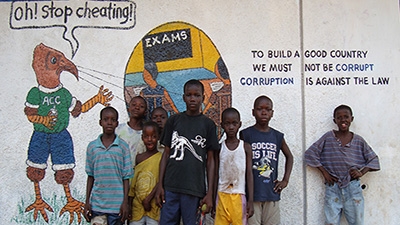Bank Contribution
Both StAR and FMI are advisory units providing strategic counsel to clients. Some lending has, in the past, incorporated AML/CFT-related components – either in the context of Development Policy Operations or Investment Operations. There are also some examples of Technical Assistance loans that included AML/CFT components. Such lending operations were then led by the respective Regions, with FMI providing technical support.
The advisory services described above include:
1) technical assistance – through workshops, mentorships, hands-on trainings and advisory services supporting countries in developing effective laws, regulations and institutional frameworks; assessing the risk of money laundering and the financing of terrorism on their economies and financial systems; training financial-sector supervisors and investigators, prosecutors, or judges; and designing and implementing effective asset-disclosure systems for public officials.
2) policy development – through collaboration and research, contributing to international debates with a unique perspective that links anti-money-laundering efforts with governance and anti-corruption, financial inclusion, ease of doing business, taxation, stolen-asset recovery, asset disclosure, environmental crime, and other development issues.
3) diagnostic evaluations – through assessments of countries’ AML-CFT regimes to diagnose effectiveness and areas of potential risk, as stand-alone diagnostics or in the context of the Financial Sector Assessment Program (FSAP).
StAR’s interventions have evolved from a strong focus on policy and advocacy work to a rebalancing toward assistance to client countries on asset recovery, putting a premium on hands-on capacity-building for recovering stolen assets that are stashed abroad. Overall, the financial resources allocated to these advisory services range between US$5 million and US$7 million per year and have been financed by a mix of Bank and Trust Funds.
Partners
In order to achieve meaningful results, both StAR and FMI work with partners in recipient and donor countries, as well as with relevant multilateral institutions and civil society organizations. The StAR Initiative is a joint partnership between the World Bank Group and the United Nations Office on Drugs and Crime, ensuring that all activities are conducted under the umbrella of the UN Convention against Corruption (UNCAC) – specifically Chapter V on asset recovery. Beyond this funding partnership, StAR is engaging other partners – international organizations (e.g., United Nations Development Programme (UNDP), OECD, FATF and INTERPOL), financial centers (e.g., G8 and G20 members, the United Kingdom, the United States, Switzerland and others), countries affected by corrupt activities and civil society organizations (e.g. Transparency International and Global Witness). FMI has also worked with a range of partners since the start of the AML/CFT program. Because of the FSAP umbrella, the International Monetary Fund is a critical partner, in terms of both policy and technical assistance. FMI is also deeply engaged with the Financial Action Task Force (FATF) and its regional bodies. Other partners include the United Nations, the Organization for Economic Cooperation and Development, the Organization for Security and Co-operation in Europe, the Egmont Group of Financial Intelligence Units, and the Commonwealth Secretariat. FMI also works with several bilateral partners – either in the context of their support and contribution to the AML/CFT program or through coordinated and jointly delivered trainings.
Moving Forward
FMI provides client countries and World Bank staff with tools that increase transparency and go after “dirty money,” with the aim of strengthening the financial soundness, safety and integrity of financial systems. Our AML/CFT and asset-disclosure tools offer innovative ways to fight crime and address development issues involving governance and anti-corruption priorities, financial inclusion, the ease of doing business, stolen asset recovery and illicit financial flows. The training and capacity-building provided by FMI helps sustain national-level efforts to strengthen the governance and anti-corruption agenda.
The World Bank is the only multilateral technical assistance provider on illicit financial flows that has a specific focus on developing countries. It is also the lone provider with the expertise and skills to cover the entire range of issues at stake in AML/CFT – including laws and regulations as well as institutional strengthening and capacity-building in the criminal justice sector. There is also a growing understanding by the G8 of the importance of action to recover stolen assets and to combat illicit financial flows. During the upcoming U.S. presidency of the G8, we will continue to provide advice and technical assistance to client countries, as well as the World Bank.

